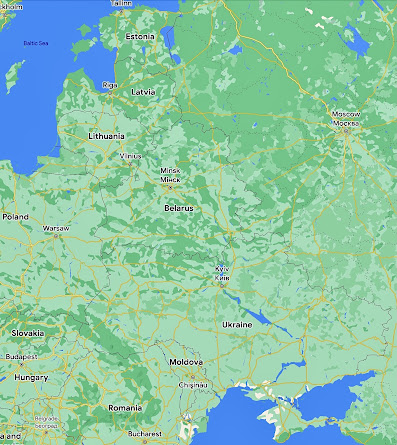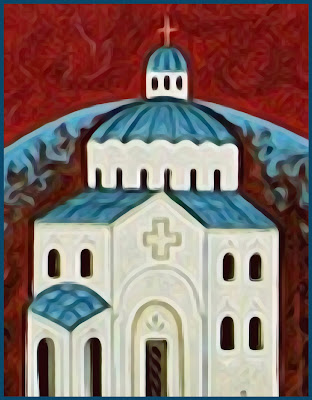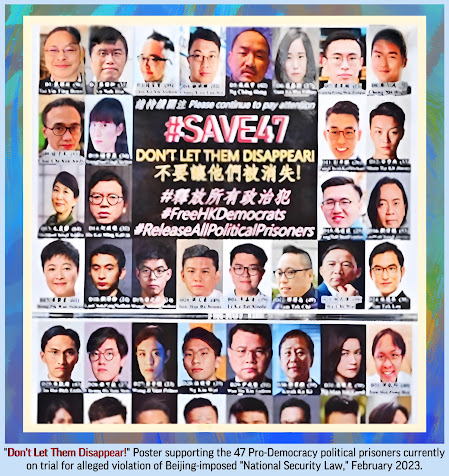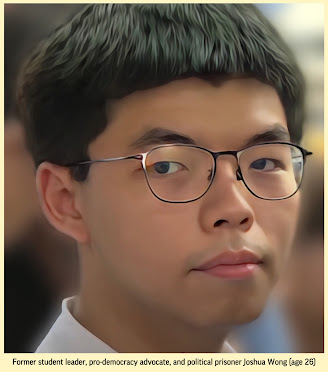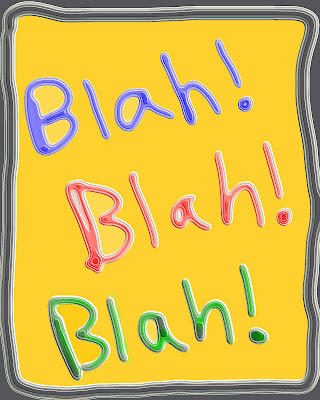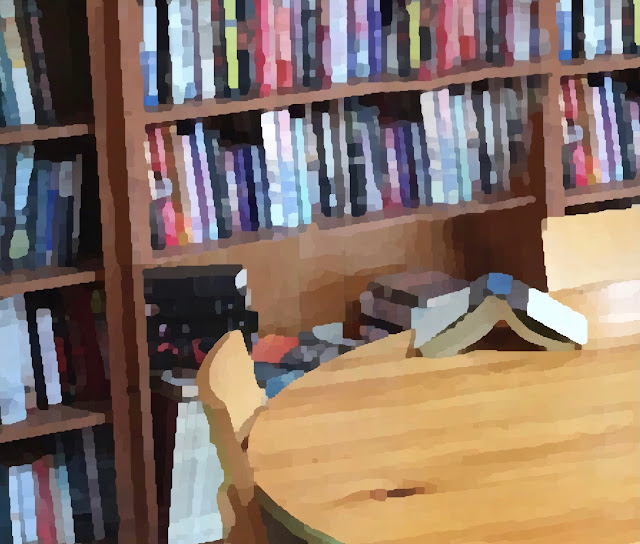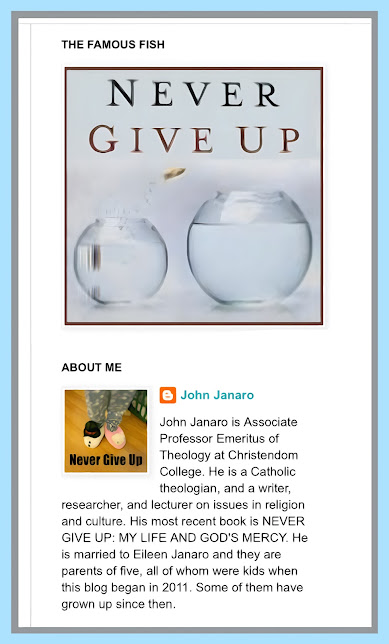Last Sunday dinner at Papa’s and Nana’s. Maria is drinking out of a regular little glass.☺️
An ordinary man engages the circumstances of daily life, seeking to draw closer to the Mystery who gives meaning to everything.
Thursday, March 2, 2023
Tuesday, February 28, 2023
The Terrible Struggle For Ukraine: A “World War”?
Russia expected that what they called their "special military operation" would overthrow the government in Kyiv within a few days. What the Russians did not expect (and, indeed, it surprised the whole world) was that the people of Ukraine were implacably determined to defend themselves and their country. Their opposition soon exposed the flaws and lack of discipline in Russia's armed forces, and established Ukraine as a credible opponent that might be able to hold its ground and even drive the Russians back. Western nations continue to give billions of dollars in military aid to Ukraine in a war that is ongoing, with Russia bogged down trying to hold territorial gains in Eastern Ukraine.
The Kremlin strategy, above all, is founded upon utter contempt for Ukraine's existence as a nation and the Ukrainian claim to be a distinctive people. The Russian armed forces have not hesitated to rain down destruction upon the whole of Ukraine, using drones to bomb civil infrastructure, destroy electric and water supplies, and kill indiscriminately Ukrainian civilians in their homes, schools, and hospitals. The war has caused the greatest European refugee crisis in generations. Eight million Ukrainians have fled the country (that's one-fifth of their entire population) and are refugees in other European nations. Many more have been internally displaced.
Ukraine's armed forces continue—with fierce determination and overwhelming popular support—to defend their country and seek to restore their borders. The rich Western countries continue to cheer for Ukraine with an uncanny unanimity and limitless “pop-culture enthusiasm.” The West has also used its most powerful asset—money—to send Ukraine weapons of various kinds, deliberating and delaying on different systems and details for various reasons.
The war is being reported and analyzed by news media in great detail. What is impossible, however, is to predict the trajectory of its escalation, who may yet become involved, and how (and when) it might finally come to an end. There remains in the West something like a desperate hope that this terrible war can be "contained" as a "local conflict," fought and won by Ukraine using Western “help”—which means spending tons of money to provide Ukrainians with state-of-the-art weapons, training, and whatever other kinds of assistance money can buy and high-profile political visits can generate. According to the “rules of war” none of this “help” makes Western nations co-belligerents in Ukraine’s war against Russia’s barbaric and criminal aggression. It is hoped that preserving this non-belligerent status will prevent the war from escalating beyond a certain point that is geopolitically manageable.
Some may argue that the “rules of war” have become more awkward to apply in the 21st century, when unimaginably advanced technologies play such a huge role in the actual fighting. The Kremlin accuses the West of fighting a “proxy-war” against Russia in Ukraine (while still refusing to say—indeed making it a crime for Russians to say—that they are even “fighting a war;” their military with all its savagery in Ukraine is merely carrying out a “special military operation”).
Nevertheless, as far as Vladimir Vladimirovitch Putin is concerned, this is already a “world war.” On this (and only this) point, there is some intelligence to his position. The Ukrainians are undoubtedly courageous, but they need the West’s advanced military hardware to defend themselves against the Russian military’s hardware that is being used to attack them. For Western nations to openly send military personnel to march (“boots-on-the-ground”) along with the Ukrainian army would be regarded as an act of war. Yet, somehow, giving Ukraine mobile surface-to-air missile launchers, teaching them how to use them against Russian targets, and supplying ammunition is not an “act of war.” Hmm, that’s how it works? Even though these kind of weapons appear to help the Ukrainians much more than sending troops? One can be excused for finding this distinction a bit beguiling. But for the moment, at least, it is given an all-around de-facto recognition, as it serves all the players in this dangerous game.
For Ukrainians this is a real life-or-death struggle for their country. They also know it is a struggle that has global consequences. If Russia can invade their country—contrary to international guarantees that Russia itself agreed to respect—and seize territory on the basis of flimsy pretexts that lack coherent evidence and have never been subjected to international arbitration, what is to stop other nations from doing the same when they want to grab territory?
Instead of making his case in a manner that could be discussed…somewhere…like the Security Council (which would be better than nothing), Putin sets forth a mixture of selectively skewed Russo-centric history, obtuse pan-Slavic mysticism, and the most obviously chaotic elements of Western society in its present crisis, and declares Russia the last hope of civilization which is under siege from the evil and manipulative West. Russia is the real victim. Russia also has a right to annex Eastern Ukrainian territory and a duty to subjugate all of Ukraine under the umbrella of Greater Russia—to save it from the corruption of Europe and the West. Or the talk switches to geopolitical spheres of influence, multipolarity, excessive Western expansion via NATO, etc. etc. etc.
Putin pulls on various levers, depending on his audience, in order to rationalize Russia’s aggression by claiming that Russia is really defending itself. “Flipping” the conflict in this way allows him to present to his own people (as propaganda)—as well as the non-Western world, which looks at all this with its own concerns and/or opportunism—an alternative narrative claiming that the West and “its Ukrainian lackeys” are the ones who are the aggressors, threatening to destroy Russia and rule the world. Here Putin draws once again on the remarkably resilient KGB propaganda playbook, using this “threat to Russia’s existence” as a pretext to make dire warnings about the possible use of nuclear weapons.
The West, and indeed the whole world, cannot ignore these warnings. Still the Ukrainian people need to defend themselves, and the West wants to “help” but doesn’t want a “world war,” so it continues to “play the game” of using the power of money to blockade Russia’s economy and to send technological devices to make its contribution to the shooting fight. The strategy is to oppose Russia’s aggression with as little risk as possible. But it may be too late to avoid risks. The world may already be at the mercy of unfolding events.
Other nations besides Ukraine are uncomfortably physically close to these events. NATO seems to have a new sense of common purpose, though it’s hard to predict how long it will last, and whether the next election cycles will change the postures of its core member states. But the most zealous members of NATO today are the relatively recent members from Eastern Europe—especially Poland and the Baltic States—who have eight centuries of experience in dealing with Moscow and who share a border with Russia. They have no illusions about the ex-KGB agent who currently occupies the bizarre throne of the New Muscovite-Russian-wannabe-Empire. And they are smart enough to realize that there is no "instant democracy" waiting to spring into existence in Russia if (when?) Tsar Vladimir is overthrown. If Putin has viable rivals, they are rivals to the throne. They will not change the trajectory of current Russian ambitions, and they may be even more ideological and more reckless.
Poland, Latvia, Lithuania, and Estonia already feel the heat from the breath of a monstrous emerging “world war.” They are not the only ones.
Nobody sees where it all might end. It would be cynical to claim that the military-industrial complex—always a reliable engine for economic stimulus in a country like the United States—might not mind a long and aimless war that enables them to manufacture weapons and make gobs of money from a government that always seems to have plenty on hand for such “necessities.” Where the government gets that money is a question that probably has answers too obtuse for it to explain to “us [we] the people.” Meanwhile, Russia might also be planning to outlast its opponents in a long stalemate… while continuing to say that they want to negotiate peace on their terms. We have already noted that their terms are less than ideal, but in reality the issues are much deeper than they are willing to admit.
Russia claims that it wants to be a regional power in a multipolar world; it wants to be “the center” of a wider realm that it envisions as its historic patrimony and responsibility (never mind that Russia’s “special military operation” to “liberate” Ukraine, or parts of Ukraine, has been carried out in an outrageously irresponsible manner). Neither history nor the present international situation, however, support Russia’s ambitions. Whatever may be the sins and machinations and schemes of powerful forces from the West, they do not warrant Russia indulging in a fresh grasp for power, particularly in the very places that have suffered under the iron grip of a prior Kremlin government until a little more than 30 years ago—a government that has never been held accountable for heinous crimes against the peoples it now wants to rule again.
Russia has a very particular problem. Moscow has a problem. The Kremlin has a problem. In the days when he was still facing down the monolithic Soviet Union, the great Alexander Solzhenitsyn saw the problem clearly (when he returned to post-Soviet Russia in the 1990s, he became somewhat confused [they were exceptionally confusing times for Russia]—but it was as a dissident, against the Soviet Union and then in his critique of the decadent West, that Solzhenitsyn attained his historic stature). In 1973, Solzhenitsyn declared that the Russia he loved—which was then the heart of a decrepit-but-still-grasping Soviet Communist MegaState—needed to renounce power. Russia needed to be healed before it returned to the global stage. It needed, as a nation, to pass through a period of "repentance and self-limitation," a looking-inward to discover and foster its constructive identity.
Repentance. Has anybody noticed that there has been no repentance for the crimes of the Soviet Union in the twentieth century? There are many reasons why the current world order is skewed, but it's worth noting that our international institutions are still based on the outcome of the Second World War. Our current agreements about international law, human rights, treaty-obligations, disaster relief, and a host of other cooperative efforts were born directly from the Grand Alliance of 1941-1945 that defeated Nazi totalitarianism and Imperial Japanese militarism, and then put on trial people who were perpetrators and collaborators in the immense violence carried out by these regimes. The intention was that people were going to be held accountable for war crimes and crimes against humanity. Even during the war, this alliance took to calling itself "The United Nations," and the institution that bears the same name today is an extension of what was born at that time.
One of these allies, however, was Stalin’s Soviet Union. Stalin was guilty of crimes against humanity on a scale approaching the level of Hitler. In 1932, he presided over an attempted genocide-by-forced-famine against the very people of Ukraine who today must once again fight for their right to exist. Stalin’s predecessors and successors perpetrated vast crimes as well, running a regime that ideologically subordinated the dignity of the human person and the real aspirations of communities and peoples to the pretenses of a totalitarian state. Russia was at the center of this state. We all now know the abhorrent truth about the Soviet Union. Yet Putin and his collaborators—having exchanged Soviet uniforms for Russian uniforms— play on their own people’s nostalgia for hegemonic power.
I don’t want Russia to be destroyed. I love Russia. Russia has its own deep human and Christian experience to share with the whole world. Russia has a mission in history. But the road ahead for the Russian people passes through penance and self-limitation, simplicity, love for the expansive lands already entrusted to them, and a humility in which they will find their real strength. Included in this is harmony and respect for their brother Slavic nations and the rest of the world. In these ways Russia will endure, even as the present world powers spend their energies on things that pass away.
But Russia will face catastrophe if its people choose to imitate the inhumanity of Stalin, thinking it might save them from the nihilism that surrounds them or the anxiety that feeds on their fears of irrelevance. If the present war becomes an extended global conflict or even a new “Cold War,” Russia will not be one of the powers that leads it. If Russia does not embrace a humble path, it will find itself humiliated by its new “limitless partner” to the south. If China props up Russia, it will do so on its own terms, as a mine for resources, a superhighway for its trade ambitions, and a passage to the new open ocean in the Arctic north.
The future can’t be predicted in detail, but in general it must grapple with the tensions and the unraveling of problems set in place by the past. I will have more reflections on this point and its relation to current-day events in another post coming soon. Stay tuned for that.
Saturday, February 25, 2023
The “Fasting” That God Wants From Us
It is important to fast—to make sacrifices regarding the food we eat—especially for us rich Western people who are healthy and take food for granted. Lent provides us with opportunities for fasting, although in the Latin rite the only obligatory fast days are Ash Wednesday and Good Friday. The whole season of Lent is “penitential,” however, and we often make various kinds of sacrifices of food or practice other acts of self-denial.
These practices help us to cooperate with God’s grace. We “make space within our freedom” for the Holy Spirit to heal us and enable us to grow in love in union with Jesus our Savior.
The point of it all is conformity to the will of God. For Christians, it is a particular challenge in our times to allow our religious observances to be integral to our desire to recognize Christ, adhere to Him, serve Him in love—love for God our Father and for our “neighbors,” our brothers and sisters in Christ, the real human persons who have been given to us each day in our lives, our work, our communities, and (especially) our churches. Then there are others that we are called to seek out and care for in their suffering, accompanying them with solidarity and compassion.
How easy it is to forget the centrality of Jesus and His purpose in shaping our lives, and subtly replace it with a self- (or group- ) affirmation of a partisan identity that we think makes us “right and good” and demeans others as unworthy (of our concern). We imagine that we are pleasing God by performing certain works—not really for the love of God but more and more like badges that we “wear” in order to declare ourselves the “Party of God”—and we don’t even notice that we are fostering dissensions, fighting, and slandering our neighbors. Then we oppress others (the poor of body and/or mind) by profiting off them—if not directly or materially, then in the inflation of our egos at the expense of their indigence. Instead of helping them we neglect them, we ignore them, or perhaps we become so full of our self-righteousness that we are unaware of their existence. We are deaf to the cries of their poverty, to Jesus Crucified in their wounds.
What value, then, is there to our fasting?
The liturgical reading from the book of Isaiah shows that there is nothing new about this problem. Also, as inspired Sacred Scripture, these words have a perennial value. The Holy Spirit speaks to us through these words today. Listening to the Spirit, with an open and humble heart, will bear important fruit that will sustain us in our Lenten journey and in difficult times to come:
[God’s People cry out to the Lord:]
“Why do we fast, and you do not see it?
afflict ourselves, and you take no note of it?”
[The Lord answers them:]
“Lo, on your fast day you carry out your own pursuits,
and drive all your laborers.
Yes, your fast ends in quarreling and fighting,
striking with wicked claw.
Would that today you might fast
so as to make your voice heard on high!
Is this the manner of fasting I wish,
of keeping a day of penance:
That a man bow his head like a reed
and lie in sackcloth and ashes?
Do you call this a fast,
a day acceptable to the Lord?
This, rather, is the fasting that I wish:
releasing those bound unjustly,
untying the thongs of the yoke;
Setting free the oppressed,
breaking every yoke;
Sharing your bread with the hungry,
sheltering the oppressed and the homeless;
Clothing the naked when you see them,
and not turning your back on your own.
Then your light shall break forth like the dawn,
and your wound shall quickly be healed;
Your vindication shall go before you,
and the glory of the Lord shall be your rear guard.
Then you shall call, and the Lord will answer,
you shall cry for help, and he will say: ‘Here I am!’”
~Isaiah 58:1-9
Friday, February 24, 2023
"February 24, 2022" - One Year Later.
This day marks the first anniversary of what is still an ongoing atrocity: Russia's attempt (yet again) to erase Ukraine's existence as a nation and a people. The Ukrainians continue to defend themselves with profound national awareness. They also continue to suffer from what appears to be Russia's almost nihilistic aggression that cares nothing for human persons, whether they be Ukrainian children, the sick, elders, or their own young conscripts, great numbers of whom they send charging recklessly at Ukrainian defense positions (reminiscent of the suicidal trench warfare in Europe a hundred years ago). The fatal casualty rate of these poor teenagers is enormous.
What will bring this nightmare to an end? God have mercy on them, and on all of us.
Today is February 24, 2023. "February 24..." A date sure to appear in future history books, as "the beginning of... what?" At least the Russian invasion of Ukraine, but what will this all turn into before it ends? No one can say at this moment in time. But kids in the future will have to memorize this date for history tests... if we still have schools in the future, and if we still care about the facts of history... (okay, overdramatic rhetoric perhaps; hyperbole, but not without reason - lots of Ukrainian kids don't have schools because they have been blown up).
Certain dates become marked permanently by horrible events that they commemorate. There have been more than a few in my lifetime. Some come to my mind right away: November 22, 1963 (assassination of JFK); May 13, 1981 (assassination attempt on John Paul II); June 4, 1989 (Tiananmen Square Massacre); and, of course, September 11, 2001 (you all remember that one). There have been others, no doubt, in the past 60 years.
Two additional dates are permanently marked in my own mind, and in many others who were personally proximate in some manner to these particular catastrophes: One of them is April 16, 2007, that awful day for my colleagues and their students at Virginia Tech University, when a deranged gunman killed 32 people—students and a few teachers—in their classrooms. The second date—for me and for tens of thousands of people on every continent in this world (most of them very young people)—needs no explanation for anyone who reads this blog or pays any attention to my social media: June 10, 2016.
What do these dates all have in common? Innocent people died on these days. Acts of shocking violence were perpetrated against them. Their humanity and their personal dignity were violated. The human community was violated. God made us to be brothers and sisters. It should be obvious why God commanded us, "do not kill" ... do not murder your brother, your sister.
Pray for our poor world. And remember February 24, 2022.
Wednesday, February 22, 2023
Lent 2023
“Let us not neglect the grace of this holy season, responding generously to the powerful promptings of Lent. At the end of the journey, we will encounter with greater joy the Lord of life, who alone can raise us up from our ashes” (Pope Francis, February 22, 2023).
Friday, February 17, 2023
Fashioned By His Grace
This week’s Collect Prayer: “O God, who teach us that you abide in hearts that are just and true, grant that we may be so fashioned by your grace as to become a dwelling pleasing to you. Through our Lord Jesus Christ, your Son, who lives and reigns with you in the unity of the Holy Spirit, God, for ever and ever.”
The Lord fashions us by His grace—God is infinite goodness, and He loves each one of us. In the most painful, most incomprehensible moments of our lives, He is with us. His love is a mystery, but our anguish can be a prayer if we trust in Him.
God is our Father, He gives us our existence in every moment. He loves us, and His love is stronger than all the agony we face in life. He “fashions” us in the joys and sorrows of this life into the persons He has created us to become, for an eternal life more beautiful than anything we can imagine.
God is good. No matter what happens, never stop trusting in Him.
Wednesday, February 15, 2023
Hong Kong: The Show (Trial) Must Go On
Love is Patience (Benny Tai)
There have been a few moments in the past few years
But the Lord Jesus always makes me feel His love again
He loves me, loves Hong Kong, loves the world,
For love He is constantly patient, waiting for them to turn and change.
When I understand why love is patient and willing to love like the Lord,
Sunday, February 12, 2023
Ten Years Later
Ten years ago today… well, I guess, it’s ten years ago yesterday at this point, but still … how strange it was on Monday morning, February 11, 2013, to go on Twitter and see THIS NEWS!
A decade later, supposedly legitimate news outlets themselves rely on social media sources, and world leaders and other important people use them to issue statements. It didn’t used to be that way, but those days seem so long ago….
Saturday, February 11, 2023
Friday, February 10, 2023
“Confidence in God’s Strength…”
“Human weakness must not trouble us if God calls…”
Ten years ago today was a Sunday, and I posted on my social media this quotation from the late Pope Benedict XVI’s Angelus Message for that day. He reminded us that God’s “strength…acts precisely in our poverty.”
The very next day—Monday, February 11, 2013—Benedict shocked the world by announcing that God was calling him to resign the Papacy. In the decade that followed, he never wavered from his conviction that he had set aside the papal office in obedience to God’s will.
Throughout his long life, Josef Ratzinger/Benedict XVI was a witness to the truth of human life as responsiveness to the call of God, free adherence to “the divine proposal, radical receptivity to the Gift that grounds all we are and all we do—the Gift that “transforms and renews” us, and is therefore worthy of our complete trust.
Thursday, February 9, 2023
World Day of the Sick, 2023
In my graphic image, I used an excerpt from some notes of Saint Bernadette, the humble visionary of Lourdes (which accompany the feast day in this month’s Magnificat). They are from her later years, after she learned to read and write and joined the Sisters of Charity. Her own health was frail, and she died of tuberculosis at the age of 35. She was a sufferer who offered her suffering to the Heart of Jesus, in union with His suffering, and for the suffering of others.
In this text she prays: “O most compassionate heart of Jesus, accept all my tears, every cry of pain as an entreaty for those who suffer, for those who weep; for those who forget you. O Mary, Mother of sorrows, at the foot of the cross you received the title of ‘Our Mother.’ I am the child of your sorrow, the child of Calvary. My Jesus, I suffer and I love you. All my cries of anguish rise to you, my Comforter. In your adorable heart I weep. To your heart I confide my sighs, my anguish, my grief to your grief. My Jesus, sanctify my sufferings by this holy union. Grant that by increasing my love for you, my grief may become lighter and easier to bear” (Saint Bernadette).
Pope Francis also has some words in his message forfor this day the recall for us the need to walk together on the path of suffering:
“Brothers and sisters, we are rarely prepared for illness. Oftentimes, we fail even to admit that we are getting older. Our vulnerability frightens us and the pervasive culture of efficiency pushes us to sweep it under the carpet, leaving no room for our human frailty. In this way, when evil bursts onto the scene and wounds us, we are left stunned. Moreover, others might abandon us at such times. Or, in our own moments of weakness, we may feel that we should abandon others in order to avoid becoming a burden. This is how loneliness sets in, and we can become poisoned by a bitter sense of injustice, as if God himself had abandoned us. Indeed, we may find it hard to remain at peace with the Lord when our relationship with others and with ourselves is damaged. It is crucial, then, even in the midst of illness, that the whole Church measure herself against the Gospel example of the Good Samaritan, in order that she may become a true ‘field hospital,’ for her mission is manifested in acts of care, particularly in the historical circumstances of our time. We are all fragile and vulnerable, and need that compassion which knows how to pause, approach, heal, and raise up. Thus, the plight of the sick is a call that cuts through indifference and slows the pace of those who go on their way as if they had no sisters and brothers….
“Experiences of bewilderment, sickness, and weakness are part of the human journey. Far from excluding us from God’s people, they bring us to the centre of the Lord’s attention, for he is our Father and does not want to lose even one of his children along the way. Let us learn from him, then, how to be a community that truly walks together, capable of resisting the throwaway culture.”
~Pope Francis, Message for the 31st Annual World Day of the Sick
Wednesday, February 8, 2023
Saint Josephine Bakhita Finds Freedom in Christ
In honor of the feast of Saint Josephine Bakhita, I present here the article on her conversion that first appeared in my monthly column in Magnificat in September 2014.
Sunday, February 5, 2023
Too Many “Wasted Words”!
What so much of it really is, in the end, is one form or another of self-affirmation, gossip, unnecessary curiosity, detraction, calumny, or cynicism. We use words to assert ourselves, or to make war on one another. And our words express what is inside our hearts. We have hearts full of violence.
I am perhaps more cautious in my choice of terms, but I am no less self-deceptive than anyone else when it comes to mudslinging or just plain talking too much. I have to ask myself, "How often, when I speak or write, am I truly seeking to point to reality, to build up life, to affirm what is good? How often are my words aimed at distraction, or at drawing attention to myself?"
I think perhaps we speak foolishly because we are insecure. We seek attention with our words, even at the expense of others. Why? Because we are afraid that we are not loved. Or, rather, we have forgotten that we are loved. We are not nourished by a vital connection with the One who loves us.
We need prayer. And not just more words of prayer. We need silence.
We need to let Him love us.
Thursday, February 2, 2023
Forty Days After Christmas
"My eyes have seen your salvation, which you prepared in the sight of all the peoples" (Luke 2:30-31).
It's Forty Days after Christmas. Happy Feast of the Presentation of the Lord!
Wednesday, February 1, 2023
My Mom’s Search For Truth
I decided to elaborate more on a recent post I made for the feast of Saint Thomas Aquinas. There was a childhood memory of my mother that I wanted to place in a larger context. It pertains to this text:
I remember being four or five years old and my mother was folding the laundry and talking about the reading she was doing that was opening up her mind (and my mother had a huge, ardent, precise, and magnanimous mind). I have images in my memory from that conversation (and perhaps others): there were the two Popes (John XXIII and Paul VI) and the Council and somebody who had influenced her deeply but whose writings were confusing (that would have been the remarkable Jesuit paleontologist Pierre Teilhard de Chardin) but then a French Peasant who was a philosopher “corrected” her from going in the direction of the wild ideas that were brewing in 1960s “Teilhardism”… and, she was just learning so much. She radiated her still-youthful enthusiasm for truth and understanding.
And the four-year-old JJ was just imaging a French farmer-philosopher and whatever else and feeling that being Catholic and following the Church was not a narrow thing but an immense adventure of human reason and faith that embraced everything. Later I started noticing that wise old face of Jacques Maritain staring at me from the bookshelf on the spine of “The Peasant of the Garonne.” It was the radical beginning of my own intellectual vocation, and for many years (from childhood to age 58) it was an ongoing work that I shared with my brilliant mother. How grateful I am, and how much I miss her.
During those long-ago days, Mom was hardly confined to the laundry room of our apartment in Riverdale (northwest Bronx, NY). She had studied Chemistry in university and had an enduring fascination for the empirical sciences that served her well as a New York City public school Science teacher. She scaled back to being an “on-call” substitute teacher when my brother Walter and I came on the scene, but she continued her search for truth—especially in the area of the relationship between science and faith.
A voracious and intelligent reader, Mom first turned to Teilhard de Chardin (as did so many in those days) and was drawn to his arduous but confused efforts to articulate a Christ-centered scientific evolutionary cosmology. During his lifetime, this passionate scientist and devout Jesuit priest struggled to find words adequate for expressing his vast unprecedented vision for the synthesis of faith and scientific reason, but also humbly obeyed his Jesuit superiors who refused him permission to publish any of his speculative efforts in this area. Teilhard continued to grapple with his ingenious, powerful, perplexing, sometimes extreme intuitions until his death in 1955, accepting the continual rejections of his superiors as the will of Christ, as a suffering he was called to embrace. He also worked privately on his conjectural but (he was convinced) important thinking and writing projects, even in the face of the prospect that he might never be able to publish them.
Teilhard’s explorations have drawn attention to important problems, and may point toward a richer development of our understanding of the mystery of the Incarnation. They deserve (and have received, somewhat, over the years) careful and critical study by expert theologians who also have competence and training in the empirical sciences. Whatever Teilhard was up to at the time of his death, it was pretty clear that it required more work and some significant corrections. Time was needed for this work to be done in a sober manner, without excessive and premature enthusiasm.
But “the times they were a’changin…”🎶
After Teilhard de Chardin’s death, his many friends and colleagues published everything: Teilhard’s ideas—sometimes expressed in sweeping neologisms—hit the bookstores with all their raw poetic ardor for the progress of an evolutionary convergence of all things in the Cosmic Christ. But the actual face of Jesus of Nazareth and his redeeming death for our sins seemed to get a little lost in all the new terminology, much of which was ambiguous, incomplete, and—let’s be frank—just plain mistaken theologically (not to mention unverifiable scientifically). It goes without saying, of course, that these posthumous publications became wildly popular.
The “Teilhard de Chardin Fad” was launched onto the magical mystery tour of the psychedelic 1960s. But Mom never even got on that bus. Instead, she brought her fascination, her thoughts about faith and reason, her questions and her immense curiosity to the chaplain of the Newman Center at Hunter College. He listened to her patiently, and was able to discern the intellectual “meat” that my mother needed, and that she was ready for in her late 20s. He also realized that he only needed to recommend a few books, and Mom would construct her own “self-study.” He trusted that she would grow in her genuine intent to advance her intellectual life while remaining faithful to the Church’s magisterium (there were no graduate theology programs for lay students—much less lay women—in those days, but Mom would eventually earn her Master’s degree in theological studies in 1991). Without neglecting the other great thinkers of the era, this wise priest made sure that Mom would discover Saint Thomas under the direction of his most dynamic 20th century exponents. Mom read these books and acquired more of them. And she shared her great learning adventure—her growth in the knowledge of the truth—with me.I will always be grateful to Msgr. Herman Heidi (and my mother) for the fact that GIANTS occupied the bookshelves of my childhood home. Romano Guardini. Henri de Lubac. Jean Danielou. Others too. And, of course, the old peasant Jacques Maritain—lots of Maritain, but always in my memory the face of the (then) octogenarian hermit who went to live on the Garonne river with the Little Brothers of Jesus after his beloved wife Raissa died.
Tuesday, January 31, 2023
“Endure Your Trials as ‘Discipline’…”
“Endure your trials as ‘discipline;’ God treats you as his sons. For what ‘son’ is there whom his father does not discipline? At the time, all discipline seems a cause not for joy but for pain, yet later it brings the peaceful fruit of righteousness to those who are trained by it.
“So strengthen your drooping hands and your weak knees. Make straight paths for your feet, that what is lame may not be dislocated but healed.”
—Hebrews 12:7-13
Monday, January 30, 2023
Sunday, January 29, 2023
Twelve YEARS of “Never Giving Up”!
This Blog appears to be aptly titled: Never Give Up is now 12 years old, and it shows no signs of… y’know, “giving up.” Why? Am I really that crazy?
My Blog is still going strong, even though the “hits” on individual articles have plummeted to discouragingly low levels. (Although I don’t really know what those numbers signify.) Sometimes I feel like I’m “The Last Blogger.” I do see Blogs out there, but often their most recent posts are, like, from 2018. I’m not putting anybody down; in fact it’s perfectly reasonable. I wonder, however, how many current Blogs there are out there that have posted 200+ days every year for the past 12 years. And every post is still in the archives! It’s also backed up on PDF files, and a couple of other formats. I hope it will thus survive any Internet disasters that might come along, and remain accessible in some form in the future.
Right now, I probably have enough readers to put in a small classroom… for a seminar. I probably never had much more than that for most of my articles and posts. Sometimes all they get is an “experimental” (i.e. strange) piece of “digital art.” Other times they get pictures of a cute baby. But there is a fair bit of substantial (if rough) writing, and if I repeat the same themes over and over, it’s because I myself need to revisit and remember them again and again.
There is some material here that should be polished up and put into a more high profile publication. At this stage, I would need technical and editorial assistance to make that happen, and I have no way to hire anybody. It would have to be a labor of love for them (as it is for me)—and I mean the kind of love that looks like this: $0.00 per hour/day/week/month/etc.
I had a couple of Blogs prior to this one. I think I started my first Blog in 2006, when bloggery was already well-established. I was still teaching, and I tried to use it as a potential “new media” forum for interacting with my students. Didn’t have much success with that.🤪 In fact—dear former students, if you happen to be reading—it was one instance in which I deserved all the eye-rolls you gave me or at least wanted to give me (and it wasn’t the only instance, but it was one that I remember). Although I did offer chances for extra credit. People always want extra credit, right?😉
Around the same time, I joined that “Facebook” thingy. But it took me a few years to warm up to using social media. After my book Never Give Up: My Life and God’s Mercy was published in 2010, I began to do more stuff on the Internet. I asked my peeps on Facebook if they would be interested in me doing a Blog and of course there were plenty of people who said, “YES!” (There may have been plenty of others who thought, “No,” but they weren’t gonna post that in the comments.)
Thus I became a “blogger” during what may have been peak season of Blog-dom. Everyone had a Blog. Some Blogs had huge followings and their authors were like rock stars in the world of new media. But then along came Twitter and Instagram and TikTok, turning everyone into producers (and consumers) of short, random, flashy multimedia “shows.” The last decade saw the evolution and extension of audiovisual interactive media on a scale beyond anything we could have imagined in 2011 (well, the folks with webcams making their own funky little videos on YouTube were ahead of the curve). Then, of course, screens shrunk to the size of cell phones even as they exploded with dazzling and distracting (or “engaging”) new kinds of content, and everyone has gadgets with tools to produce and/or share audiovisual “splashes” to the whole world. #️⃣HashtagGlobalVillage #️⃣HashtagNOISYGlobalVillage. Ah, McLuhan saw it all coming 60 years ago. He proclaimed it. He warned us about it.Meanwhile, blogging is dying. A hangover from the old “Gutenberg Galaxy.” Electronic publishing and distribution have certainly revitalized the printed word (or, rather, the virtually printed word). Books, flyers, newsletters are ubiquitous. The “printed word”—precisely because it is NOT printed—has discovered an unimaginable plasticity. The written word has never been bigger. It’s like a supernova, the last glory of a dying star. The more graphically malleable printed words become, the more they draw on the visual powers of the image. Might we even say, the more they merge with the image?
I’m not saying this is good or bad. I’m just trying to understand what’s happening.
Words are far from “dead,” of course. The written word will endure in all that is essential to it. Attentive writing (and attentive reading) will be rare, but then again that has always been the case. Most of the printed words of the Gutenberg epoch were not really necessary. The essential words will remain legible, and perhaps they may be crafted as they once were, with distinctive visual beauty (even new forms of beauty that will enrich the reading experience). Moreover, audio technology (think of audiobooks, podcasts, recorded lectures, etc.) has revitalized and rendered accessible in new ways the beauty of the sound of words and the possibilities for listening to the spoken word.
Maybe I should do a podcast?
Anyway, here is page one, January 29, 2011. Whatever form communication takes, it will never cease to be the gesture that Luigi Giussani speaks of here. And I will continue to pray for “more light and more strength.”


